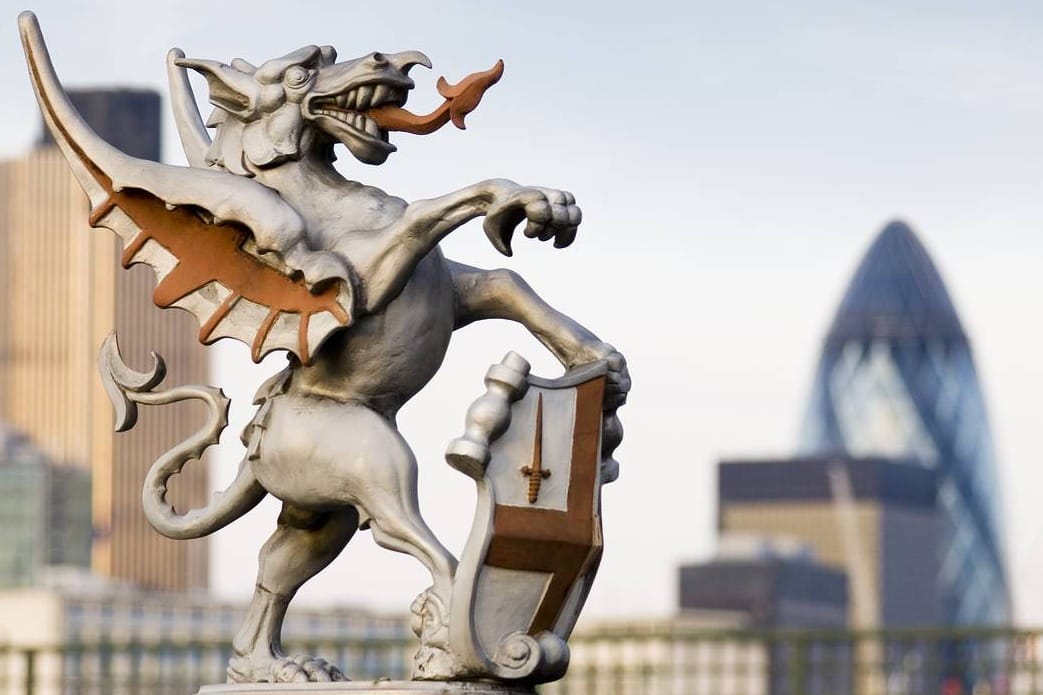The Square Mile
The Square Mile is the oldest part of Greater London.

Key words
- Sovereignty: the power or authority to rule
Talks are being held about who should have sovereignty over the island.
- Wane: to become weaker in strength or influence
Traditional employer-funded pensions are on the wane.
- Antagonize: to make someone dislike you or feel opposed to you
The company doesn’t want to antagonize one of its biggest oil suppliers.
- Government bonds: an official paper given by the government to show that you have lent them money that they will pay back to you at a particular interest rate
He keeps about 40% of his assets in stocks, with the remainder invested in bonds and cash.
- National debt: the total amount of money that is owed by a country's government
They doubled the national debt in just under five years.
- Joint-stock company: a company that is owned and controlled by shareholders, with shares that are traded on a stock market
The Company of Merchant Adventurers was the first major chartered joint-stock company in history.
Read the article to find the answers
- Who built Londinium?
- Who rebuilt it 800 years later?
- What role did the City of London play in the Glorious Revolution?
- What happened after the Glorious Revolution?
Londinium
Greater London is home to over 9 million people, but the City of London is much smaller, much older and has a much more interesting history. Known as the Square Mile, it is home to the Bank of England and is one of the world's most important financial centres.
It began when the Romans established a major trading centre called Londinium in the first century. The Romans withdrew from Britain completely after 400 years and it was another 400 years before the old Roman settlement was rebuilt and the City of London was permanently established by the Anglo-Saxon King Alfred the Great.
In 1066, William the Conqueror marched on London but failed to defeat the Londoners, and 600 years later when the Scottish monarchy attempted to assert sovereignty over the City of London, the City replaced it with a new monarchy from the Netherlands.
The Glorious Revolution
The English Reformation caused deep divisions between Catholics and Protestants, eventually leading to a civil war over governance, taxation and religious freedom, led by Oliver Cromwell, who executed the pro-Catholic Scottish king and established a republican government.
After Cromwell's death, public support for the republican government waned and there were calls for the restoration of the monarchy. When the monarchy was restored and King Charles II took the throne, he attempted to assert sovereignty over the City of London, but ultimately failed before his death. His brother King James II took the throne and continued to antagonise the City of London.
A group known as the Immortal Seven met in the City of London and formally invited William of Orange to invade England from the Netherlands, providing him with the logistical and financial support needed to overthrow King James II. This became known as the Glorious Revolution.
Financial Revolution
The period after the Glorious Revolution is often referred to as the Financial Revolution. The first ever government bonds were issued, allowing the government to create the first ever national debt.
The Bank of England, one of the earliest and most influential central banks, was established as a private institution to manage the growing national debt and to serve as a banker for the English government.
Informal trading in joint-stock companies began in coffee shops in the City of London. Brokers later drew up a set of rules and formed a trading club, which later became the London Stock Exchange.
Discussion questions
- Do you have any questions about any of the vocabulary or grammar in this article?
- Have you ever been to the City of London?
- What's the history of your country's central bank?
- What do you know about the various rituals associated with the City of London and the monarchy?
- Do you invest in bonds or stocks?

Book a Lesson
Improve your English language communication skills by practicing with a qualified and experienced native speaker.





